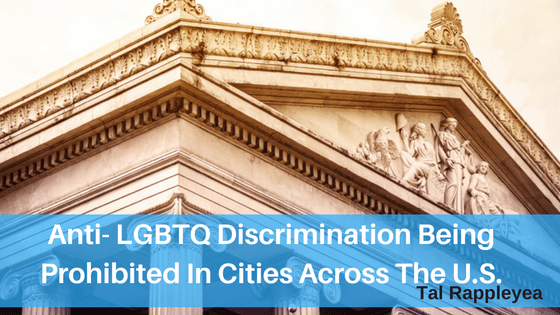Last month, the Human Rights Campaign released its fifth annual Municipal Equality Index (MEI) in partnership with the Equality Federation Institute. The MEI is the only nationwide system that exists to rate the level of LGBTQ inclusion in municipal law and policy.
According to the 2016 MEI, municipalities in both red and blue states are enacting laws and policies prohibiting discrimination against LGBTQ people in housing, employment and public accommodation. These cities are enacting these policies despite some elected state officials threatening to deny cities the ability to extend full-inclusive protection to their workers and residents. These cities are not intimidated by these officials, and are instead working to ensure that everyone has the same access to city services. They aren’t waiting for their states to extend vital protection to the LGBTQ community; they’re taking action now.
Since last year, the number of cities achieving perfect scores on the MEI increased from 47 to 60. However, there is still anti-LGBTQ legislation such as North Carolina’s HB2, which prevents cities from passing LGBTQ-inclusive non-discrimination ordinances. But despite North Carolina’s actions, cities across the country are passing non-discrimination ordinances and doing away with harmful exceptions to existing ordinances.
Human Rights Campaign President Chad Griffin states that the cities’ determination to stand up for LGBTQ people when state governments refuse to do so is proof that local governments are at the forefront of the fight for equality. Unfortunately, this progress has occurred among those pushing for anti-LGBTQ laws and policies as well. Anti-LGBTQ lawmakers have in recent years pushed legislation with the intent of pre-empting local protections. According to Griffin, this is why it’s important to fight to enact federal protection for LGBTQ people under the Equality Act.
Since the debut of the MEI in 2012, the number of cities with perfect scores has more than quintupled. Progress on transgender equality has been especially significant. Since 2012, the number of municipalities with transgender-inclusive healthcare benefits offered to employees increased from 5 to 86.
This year was the first time that the MEI deducted points in cities where non-discrimination protections have carve-outs that prevent people from using public facilities consistent with their gender identity. There was also a new category of points for cities that offer city services specifically catering to the needs of transgender people.
Despite the absence of state laws in certain states, cities continue to excel in the way of anti-discrimination laws to protect the LGBTQ community. This year, 37 cities in states that lacked comprehensive non-discrimination laws scored above 85 points. 87 cities in states without these laws scored above the nationwide mean of 55 points. Cities with a higher proportion of same-sex couples tended to score higher. The presence of city officials who are openly LGBTQ also correlated to higher scores.
The Municipal Equality Index is a great way for us to be able to asses how much progress is occurring in the way of LGBTQ protection under the law. There is still a lot of progress to be made, especially at the federal and state levels, but there a number of cities around the world that are standing up for the LGBTQ community. This shows that our country is moving toward providing more and more protection for the LGBTQ community.
